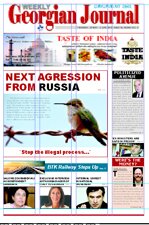The US and Chechnya
25 April, 2013
 Americans don't know much about Chechnya. The most recent conflict rekindled around the time Putin and the FSB was given power in Russia at the end of 1999 and beginning of 2000, and lasted until around 2007. Unlike the Chechen war in the 90's, this was not simply a nationalistic insurgency, but had a strong element of international political islam.
Americans don't know much about Chechnya. The most recent conflict rekindled around the time Putin and the FSB was given power in Russia at the end of 1999 and beginning of 2000, and lasted until around 2007. Unlike the Chechen war in the 90's, this was not simply a nationalistic insurgency, but had a strong element of international political islam.The Bush administration expended a great deal of effort to make muslim terrorism the number one military target of the United States after the attacks of 11 September 2001. Because of this, Russia called the war in Chechnya and the North Caucasus its own war on muslim terrorism that it would take care of it on its own. It was an internal matter. The United States, which wanted Russian help with its own wars in Afghanistan and Iraq, agreed to let them do what they wanted and still more or less does. The notable exception was the recently passed Magnitsky act which Putin found very insulting, it prevents a group of corrupt Russian officials the ability to get visas to come to the United States. More worrying for Russian officials is if the Schengen Area looks at doing the same.
But then there was the bombing at the finish line of the Boston Marathon that killed three people and injured many more and has been all over the news for the last several days. The bombers were two young immigrants to the US, originally from Central Asia and of Chechen descent. So American newspapers and news shows for the last several days have been showing maps of the area trying to explain to Americans where all these places are and how they are connected with each other. The last time there was this much coverage of the area was during the 2008 war.
Soon before that war, Chechnya was subdued via the tried and true method of sub-contracted dictatorship and corruption, led by Ramzan Kadyrov. Assisted by almost complete isolation from journalists and international organizations, he has managed to subdue his opponents within Chechnya and encourage them to move into other areas of the North Caucasus, particularly Dagestan which now has several bands of insurgents and training camps.
Frankly the US can't do much about this. It has its hands full in other wars and has other priorities. And even if it did care more about the North Caucasus, it is not clear what it could do. Russia instinctively and strategically doesn't want the world to see what is happening there and is too suspicious of the United States to allow much coordination about these places on a political or policy level. It has been worthy of noting however that Russian authorities called the FBI in the US about one of the bombers and said that they thought he was a risk due to connections via Dagestan to potential jihadists.
The North Caucasus for the lasts several years, and its two appendages into Georgia, Abkhazia and South Osetia, are are in some way's gray zones. They are largely closed to the world and yet it is not clear who is responsible for them. Many say Chechnya has been granted de facto independence in exchange for public loyalty to the Kremlin. Clearly this us unlikely to be a long term arrangement. Sough Ossetia and Abkhazia are in legal limbo, when trouble happens there, legally they are a part of Georgia but in fact run by internal groups working with parts of the Russian government; responsibility is not clear. Chechnya and the rest of the North Caucasus is a dangerous place for journalists to go and even more dangerous for them to talk about in depth. Journalists get killed and there never seem to be any convictions. Dagestan is now the most violent of these places, particularly in the mountains and there is certainly cooperation between international jihadists and like minded people from the North Caucasus taking place there.
For Georgia this is connected to several things, the first is the Pankisi Valley and the Kists who live there. For many years there have been rumors in Russia that Chechen fighters were coming into Pankisi to rest or be trained. It fit with the Russian tendency to group "Caucasians" together. And at times it did happen. The recent events just before the election in the Lapankuri forrest near the border with Dagestan were of particular concern. The story of the former government changed, and it is not clear who was killed there and why. Certainly in the Caucasus, the temptation to think of your enemy's enemy as your friend has a long history, but let's hope that that has not been the case with the Government of Georgia for many years.
Very important in all of this are the Winter Olympics in Sochi, a ski resort at the western end of the Caucasus. The decision by the Olympic Commitee to hold the olympics in an area near so much hotly contested territory was an odd one. The possibility of attack is significant, let's hope one doesn't happen. But if one does and whoever attacked has been through Georgia, it will be a very serious problem.
Georgia has benefited greatly from visa free travel and is once again becoming the important regional hub it was before 1921 and was during much of its history. But the problem of border security is an important one influencing US policy towards Georgia, influencing Georgia's access to facilitated visas with the EU and elsewhere, and being always on the agenda between the US and Georgia. Washington has little ability to deal with the North Caucasus except as a part of its long list of issues it talks to the Kremlin about. But the US has very strong relations with Georgia and Georgia's longest border is the North Caucasus. Let's hope that Georgia is in control and coordinating carefully who comes and goes.
SEE GEORGIAN VERSION












































